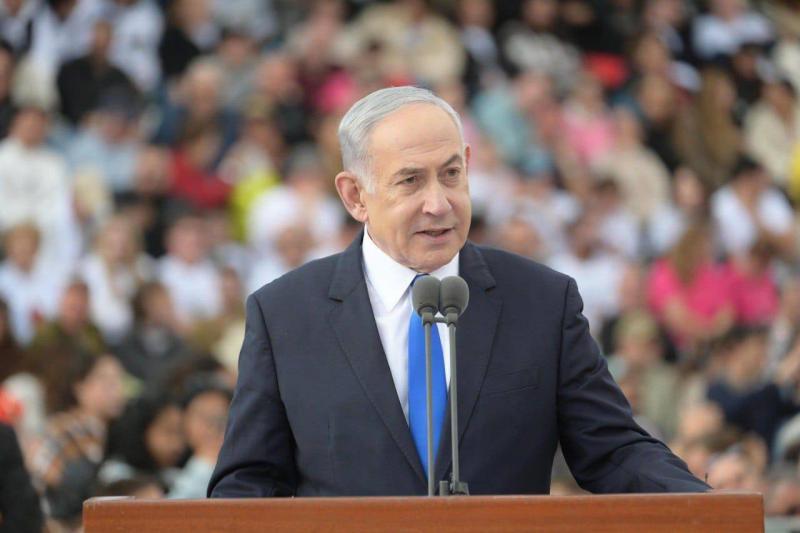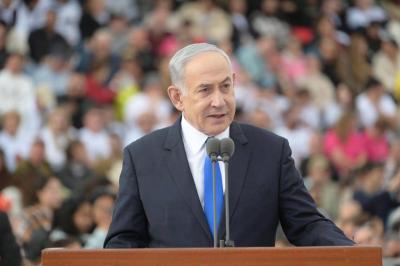Despite the increasing weight of opinions both within Israel and in many global capitals asserting that Netanyahu is stalling the war on Gaza because he knows that once this war stops, Israelis will more resolutely focus on investigating the failures of October 7 and press for early elections that could result in a vote against his continued position, focusing solely on Netanyahu represents a failure to recognize that the war in Gaza is not solely his war; it is the war of all Israel. The issue cannot be reduced to Netanyahu alone as it extends to voters and the overall political parties and movements within Israel. Blaming Netanyahu, who refuses to exit Israeli political life, overshadows the reality that when it comes to Israeli policies towards Gaza in general and the specifics of the two-state solution in particular, a large majority of Israelis are broadly aligned with Netanyahu's positions. They significantly support the current military campaign in Gaza and endorse the goal of destroying Hamas, regardless of the human losses among Palestinians. Thousands of Israelis who took to the streets in protests are not protesting the war or demanding a ceasefire or peace; nor are they protesting the unprecedented killing of Palestinians or the restrictions on humanitarian aid access that have led to widespread famine, with some going so far as to prevent aid from entering the Gaza Strip. They are certainly not invoking the need to end the military occupation that has now entered its fifty-seventh year, as they primarily demand swift action to release the hostages and insist on Netanyahu's departure due to his direct responsibility for the bloody security catastrophe witnessed on October 7.
Israeli society is rapidly shifting to the right, with the attacks of October 7 fueling extreme views. The drift to the right has become a defining feature of the Israeli political fabric. A significant majority—88%—of Jewish Israelis surveyed last January believe that the staggering number of Palestinian deaths is justified under the conviction that Hamas imposed this "war with no choice on Israel," and that Hamas must be destroyed as a necessity for Israel's survival. Even the famine in Gaza and the extent of the destruction, along with the immense number of Palestinian casualties, has not spurred opposition to the campaign. Another poll conducted by the Israeli Democracy Institute in February indicated that two-thirds of Jews oppose the proposal for Israel to agree in principle to the establishment of an independent, demilitarized Palestinian state.
The belief that the October 7 attacks and the ensuing war will make a two-state solution an urgent priority clashes with the reality that we may not need further surveys to discover that support for a two-state solution has steadily decreased among Jewish Israelis in recent years, reaching its lowest level ever. One can look only at the positions of Jewish political parties in Israel, nearly none of which support the two-state solution, and those in power vehemently reject it and work hard to frustrate its occurrence altogether. Thus, placing the entire blame on Netanyahu misfires as it ignores the fact that Israelis have long reinforced the system of military occupation and dehumanization of Palestinians, undermining opportunities for reconciliation. This applies to other members of the war cabinet, who are often portrayed as balancing figures or potential alternatives to the Prime Minister. It was not Netanyahu, but his Defense Minister, Yoav Galant, who called for a complete blockade on Gaza after October 7: "No electricity, no fuel, no food, everything will be closed." It was not Netanyahu, but the supposed centrist president, Isaac Herzog, who hinted at considering all residents of Gaza a legitimate target when he said at the war's outset that there is "an entire nation responsible" and that they all are complicit in the October 7 attack.
A realistic reading of the prevailing situation in Israel necessitates recognizing that ousting Netanyahu will not necessarily lead to meaningful political changes towards a two-state solution. If Benny Gantz, the former Israeli Minister of Defense and chief of staff of the Israeli army, becomes Prime Minister, he is unlikely to adopt Palestinian-related policies that significantly differ from Netanyahu's, which applies in varying degrees to other figures qualified to succeed him who will find themselves in a position compelled to form a "coalition" government that will not be free of right-wing influence. Even with the expectation of the war ending sooner or later, and the growing recognition among various influential international and regional parties of the need to move towards a settlement based on the "two-state solution," assuming seriousness and goodwill, the transformations occurring within Israeli society and its complex political structures will pose among the greatest obstacles to achieving the desired development.
The overwhelming majority of the political factions in Israel lack the understanding that establishing a Palestinian state—not merely destroying Hamas—is the guarantee against a repetition of events like those of October 7. Addressing this serious goal is the only path that will genuinely enhance Israel's security and open up the possibility for normalization and the establishment of healthy relations with all countries in the region. Without a two-state solution, Israel risks becoming a "deeply entrenched apartheid state," exceeding that of South Africa. The notion that Israel can continue to control 4.5 million Palestinians without rights and maintain an occupation that can last indefinitely is untenable, and continuing to ignore the Palestinian issue and the rights of Palestinians will not spare Israel from scenarios similar to those witnessed last October. Especially since the military option and the use of brute force alone cannot secure the safety and stability Israel and its people desire.
Perhaps the most significant challenges facing all parties involved concern "where the proposed Palestinian state will be located," assuming there are Israeli leaders capable of making concessions on land that has eroded through settlement and some parties consider to be an inseparable part of Biblical Israel. The number of settlers in the West Bank has now exceeded 650,000, spread across more than 140 different settlements, in addition to over 220,000 settlers in East Jerusalem, amidst fundamental changes in the geographical nature and demographic composition of the occupied Palestinian territories.
In contrast, Palestinians bear the responsibility of overcoming their political divisions and rebuilding their shared sense of identity while recognizing the realities of the era and the real power balances globally and regionally. They must establish feasible concepts to salvage what can be salvaged after numerous opportunities for settlement have been lost, for which they do not bear the sole responsibility, ensuring that the end of the war in Gaza does not devolve into a mere "temporary halt" to further violence from both sides.




